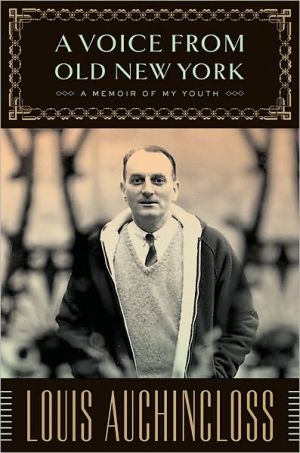
A Voice From Old New York: A Memoir of My Youth PDF
Preview A Voice From Old New York: A Memoir of My Youth
At the time of his death, Louis Auchincloss—enemy of bores, self-pity, and gossip less than fresh—had just finished taking on a subject he had long avoided: himself. His memoir confirms that, despite the spark of his fiction, Auchincloss himself was the most entertaining character he has created. No traitor to his class but occasionally its critic, he returns us to his Society which was, he maintains, less interesting than its members admitted. You may differ as he unfurls his life with dignity, summoning his family (particularly his father who suffered from depression and forgave him for hating sports) and intimates. Brooke Astor and her circle are here, along with glimpses of Jacqueline Onassis. Most memorable, though, is his way with those outside the salon: the cranky maid; the maiden aunt, perpetually out of place; the less-than-well-born boy who threw himself from a window over a woman and a man. Here is Auchincloss, an American master, being Auchincloss, a rare eye, a generous and lively spirit to the end.
From Bookmarks MagazineIn a world where privacy is increasingly passé, A Voice From Old New York may seem quaint. Auchincloss follows the traditional autobiographical form: confessions of petty crimes and sexual dysfunction and recollections of childhood education and upbringing, followed by his career as an attorney and a novelist. He relegates his wife and children to cameo appearances. As in his other works, Auchincloss is at his best as a detached observer and bemused critic of his East Coast upper-class society, though, as some critics note, a “note or two of snobbery is inevitable” in this somewhat self-indulgent memoir (Boston Globe). Despite its flaws, fans may still relish the final glimpse that Auchincloss offers us into a fading way of life, as well as wish to sample some of his other books about the manners of the Northeastern upper class.
From BooklistReaders who were saddened by the thought that Louis Auchincloss’ death earlier this year at the age of 92 meant an end to his long string of novels and stories will welcome this memoir. In his trademark graceful style, Auchincloss takes us through his childhood in New York City, Long Island, and Bar Harbor, Maine; his boarding-school days; his stint at Yale; his wartime service; and his early legal career, all of which will resonate with readers familiar with his fiction. It was at Yale that he discovered the joys of literature and the lure of writing. When his first novel was rejected, he turned to law instead. The most straightforwardly autobiographical portion of the book ends when he decides to take a break from law in order to write full time. In the later chapters, he offers reflections on memorable people, social customs and class (which he quickly recognized as a preoccupation in his writing), and even animals. Incisive, perceptive, open-minded, open-hearted, and civilized, just like the rest of his work. --Mary Ellen Quinn
